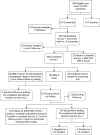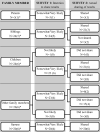Universal screening for Lynch syndrome among patients with colorectal cancer: patient perspectives on screening and sharing results with at-risk relatives
- PMID: 28176204
- PMCID: PMC5958898
- DOI: 10.1007/s10689-017-9972-2
Universal screening for Lynch syndrome among patients with colorectal cancer: patient perspectives on screening and sharing results with at-risk relatives
Abstract
Universal screening for Lynch syndrome (LS) among all cases of colorectal cancer (CRC) could increase the diagnosis of LS and reduce morbidity and mortality of LS-associated cancers. Given universal screening includes all patients, irrespective of high risk factors such early age at onset or family history of CRC, it is important to understand perspectives of all patients and not just those at high risk. As part of a study to assess the feasibility and implementation of universal screening, 189 patients newly diagnosed with CRC were surveyed about their interest in screening for LS and communication of results with at-risk family members. Overall, participants responded positively regarding screening for LS, with most wanting to know their genetic risks in general (86%) and risk of hereditary CRC (93%). Prior to receiving screening results, most participants stated they intended to share their screening results with parents (89%), siblings (96%), and children (96%). Of the 28 participants who received a positive LS screening result, 26 (93%) reported sharing their result with at least one first-degree family member. Interest in screening for LS and communication of screening results with family members was not associated with high risk factors. This study indicates that patients are interested in being screened for LS and that sharing information on the risk of LS with at-risk family members is not a significant barrier. These findings provide novel insight into patient perspectives about screening for LS and can guide successful implementation of universal screening programs.
Keywords: Colorectal cancer; Genetic screening; Genetic testing; HNPCC; Lynch syndrome; Microsatellite instability.
Conflict of interest statement
The authors declare that they have no conflict of interest.
Figures






Similar articles
-
Worldwide variation in lynch syndrome screening: case for universal screening in low colorectal cancer prevalence areas.Fam Cancer. 2021 Apr;20(2):145-156. doi: 10.1007/s10689-020-00206-0. Epub 2020 Sep 11. Fam Cancer. 2021. PMID: 32914371
-
Universal tumor screening for Lynch syndrome: Assessment of the perspectives of patients with colorectal cancer regarding benefits and barriers.Cancer. 2015 Sep 15;121(18):3281-9. doi: 10.1002/cncr.29470. Epub 2015 Jun 2. Cancer. 2015. PMID: 26036338 Free PMC article.
-
Lynch syndrome screening in newly diagnosed colorectal cancer in general pathology practice: from the revised Bethesda guidelines to a universal approach.Scand J Gastroenterol. 2011 Nov;46(11):1340-8. doi: 10.3109/00365521.2011.610003. Epub 2011 Aug 31. Scand J Gastroenterol. 2011. PMID: 21879804
-
Universal Screening of Colorectal Cancers for Lynch Syndrome: Challenges and Opportunities.Dig Dis Sci. 2016 Apr;61(4):969-76. doi: 10.1007/s10620-015-3964-6. Epub 2015 Nov 24. Dig Dis Sci. 2016. PMID: 26602911 Review.
-
Comparison of Universal Versus Age-Restricted Screening of Colorectal Tumors for Lynch Syndrome Using Mismatch Repair Immunohistochemistry: A Cohort Study.Ann Intern Med. 2019 Jul 2;171(1):19-26. doi: 10.7326/M18-3316. Epub 2019 Jun 11. Ann Intern Med. 2019. PMID: 31181578
Cited by
-
"Go ahead and screen" - advice to healthcare systems for routine lynch syndrome screening from interviews with newly diagnosed colorectal cancer patients.Hered Cancer Clin Pract. 2023 Nov 17;21(1):24. doi: 10.1186/s13053-023-00270-4. Hered Cancer Clin Pract. 2023. PMID: 37978552 Free PMC article.
-
Comparison of universal screening in major lynch-associated tumors: a systematic review of literature.Fam Cancer. 2022 Jan;21(1):57-67. doi: 10.1007/s10689-020-00226-w. Epub 2021 Jan 11. Fam Cancer. 2022. PMID: 33426601
-
Implementation of a Systematic Tumor Screening Program for Lynch Syndrome in an Integrated Health Care Setting.Fam Cancer. 2019 Jul;18(3):317-325. doi: 10.1007/s10689-019-00123-x. Fam Cancer. 2019. PMID: 30729418 Free PMC article. Clinical Trial.
-
Beyond the Variants: Mutational Patterns in Next-Generation Sequencing Data for Cancer Precision Medicine.Front Cell Dev Biol. 2020 May 19;8:370. doi: 10.3389/fcell.2020.00370. eCollection 2020. Front Cell Dev Biol. 2020. PMID: 32509788 Free PMC article. Review.
-
Worldwide variation in lynch syndrome screening: case for universal screening in low colorectal cancer prevalence areas.Fam Cancer. 2021 Apr;20(2):145-156. doi: 10.1007/s10689-020-00206-0. Epub 2020 Sep 11. Fam Cancer. 2021. PMID: 32914371
References
Publication types
MeSH terms
Grants and funding
LinkOut - more resources
Full Text Sources
Other Literature Sources
Medical
Research Materials

